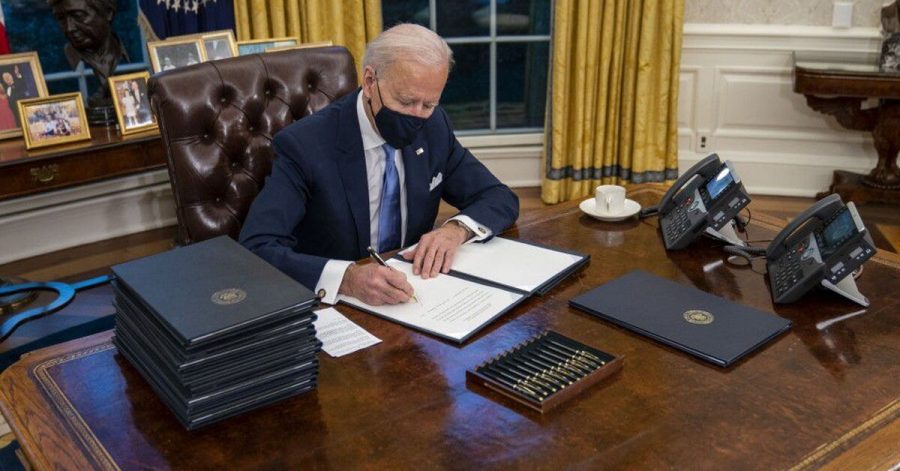Setting the Tone in the Biden Administration’s First 100 Days
February 16, 2021
Since Franklin Delano Roosevelt, the first 100 days of each presidency has been an opportunity to set the right tone for the administration. The American people can often get a good understanding of what the current president will try to accomplish during their term in office by paying attention to the first 100 days. President Joe Biden is looking to set a strong tone by establishing his priorities early on in the administration.
The Trump administration intentionally made the transfer of power difficult. Despite this, Biden has hit the ground running as he had many of his major focuses previously laid out in his campaign.
One major policy item for Biden was rejoining the World Health Organization (WHO). In early July, heading into the peak of COVID this summer, Donald Trump pulled the U.S. out of WHO. He claimed it was limiting and unhelpful to be a part of it. As it turned out, the United States lost out on getting vaccine shipments because it wasn’t part of WHO. The U.S. also lost out on valuable information in regards to COVID research and vaccine advancement being pooled by the other member countries. One of the first things Biden did after he was inaugurated was rejoin WHO and join the world-wide fight against COVID.
Another major policy for Biden in relation to COVID-19 was a mask mandate. Biden signed an executive order mandating masks to be worn in all government buildings. A big focus for his administration is grappling with the pandemic, and so he is working to do everything he can to create a safe environment for our country.
Former President Trump previously pulled the U.S. out of the Paris Climate Accord. Biden resigned the accords in hopes of helping to combat climate change issues during his tenure, feeling that rejoining the agreement could help bring about positive climate change in our country and in the world.
One major focus from the beginning of Biden’s campaign was immigration reform. Since his first day in office, Biden has signed and introduced three key aspects of immigration reform. He reversed a ban on immigrants coming from predominantly Muslim countries introduced by the Trump administration. In addition, he introduced a new immigration bill with many focuses, including making it easier for immigrants to obtain green cards. He also strengthened the consideration of deferred action for childhood arrivals as immigrants. During Biden’s presidency, we can expect to see many more pieces of legislation in regard to immigration introduced by the administration, as well as push back from Republican lawmakers and judges.
Aside from policy, Biden has also undergone the process of nominating cabinet members. Ordinarily, a large number of the cabinet would have been approved already, but because of delays caused by the Trump Administration and Republican lawmakers, no cabinet members were confirmed before the inauguration. However, Biden was able to get four key cabinet members approved by the Senate. These include: Secretary of State Antony Blinken, Secretary of Defense Retired Gen. Lloyd Austin, Director of National Intelligence Avril Haines, and Secretary of the Treasury Janet Yellen.
This transition has a very symbolic meaning besides the Biden administration’s policy objectives. It symbolizes a change in thinking, a change in the approach toward things like science and reason. President Biden hopes to unite the country while incorporating necessary change to our country’s institutions. As for the remaining 93 days, the Biden administration is planning to roll out more legislation and executive orders so that he can continue his agency and attempt to unite the country. Things like affordable healthcare and the confirmation of more cabinet members are on President Biden’s list. Issues have already arisen in lawsuits brought against some of the proposed bills and legislative pieces. Unfortunately, fighting these will also take up a large majority of the first 100 days.


